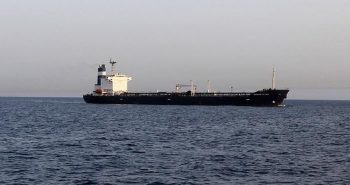The Sentry

Saddam Haftar and other actors aligned with the Libyan Arab Armed Forces (LAAF) utilize their territori al control to tax flows of fuel smuggled by others and to transport their own illicit cargo, thereby capturing revenue from the large-scale diversion of subsidized fuel. The Haftar coalition also cultivates select tribal groups, further solidifying control over smuggling networks in eastern Libya, which since 2021 has displaced western Libya as the country’s epicenter of the illegal fuel trade.
Driving this shift is Saddam Haftar, operating through the LAAF, his father Field Marshal Khalifa Haftar’s armed coalition. The young lieutenant general has reshaped parts of the NOC and other state organs to maximize his sway over fuel smuggling and other illicit activities. This strategy has enabled the Haftar coalition to grow a fuel smuggling network within the NOC and other legitimate institutions, blur ring the lines between legitimate and illicit activities.
As Saddam Haftar’s Ground Forces division has strengthened, it has prioritized illicit profits, reducing the availability of subsidized fuel outside major eastern cities. For years, northwestern Libya had been the epicenter for fuel smuggling, where contending armed fac tions alternated between clashes and tense cohabitation. This lack of unity resulted in smaller-scale, less efficient operations. After Libya’s civil war ended in June 2020, the Haftar coalition concentrated on the eastern and southern regions, solidifying its hegemony there in ways unmatched in the more fragmented west.
The result: illicit fuel volumes in eastern Libya surged, hurting the country’s economy. Beyond immediate profits, Saddam Haftar’s big push in fuel smuggling since 2021 has yielded a self-reinforcing cycle that bolsters his sway on almost all fronts.
Maritime smuggling operations
Saddam Haftar wields extensive authority over northeastern Libya, both on land and at sea. His sway encompasses ports, roads, storage facilities, customs, border police, key parts of the NOC and Brega Petroleum, and maritime operations ranging from authorizing ships to leave port to issuing official doc uments via administrators under his influence. As a result, Saddam Haftar controls almost all of eastern Libya’s maritime smuggling, which forms a major component of the illicit fuel trade in the eastern prov ince.
Unlike overland smuggling, which cannot easily move millions of liters at once, maritime smuggling involves entire vessels diverting massive shipments of subsidized fuel — often several million liters at a time. It also involves processes designed to obscure the fuel’s origin and destination to render de tection and interception challenging for authorities abroad. These traits make maritime reexports the most efficient means of stealing fuel, responsible for an enormous chunk of the fuel diverted daily.
Two main methods of diverting imported fuel by sea have flourished, especially since : simple reexport and indirect reexport. In simple reexport operations, fuel that was imported is subsequently loaded onto a separate vessel — often in Benghazi’s old harbor or, more seldom, in Tobruk, about 440 kilometers further east — and then shipped directly to its final destination, such as Turkey.
The Queen Majeda inci dent is a prime example. Local authorities in Albania intercepted this ship in September 2022, just days after it had departed from Benghazi’s old harbor carrying more than $2 million in foreign-refined heavy marine fuel that was diverted to Albania.
In indirect reexport, a vessel carrying the imported fuel departs from a Libyan port and sails to a location in the Mediterranean Sea, such as Hurds Bank just outside Maltese territorial waters, where the fuel is transferred to another vessel in a ship-to-ship transfer. Although this extra step adds cost, it helps conceal the connection to Libya. Consequently, the receiving vessel can reach its final destination with no trace that the product originated in Libya’s subsidized fuel program.
One well-documented example is the Aristo. In November 2023, Italian authorities intercepted the vessel near Licata, Sicily, as it was about to perform a ship-to-ship transfer. The Aristo, which had sailed from eastern Libya, was carry ing about 670,000 liters of diesel picked up at Benghazi’s old harbor. If the ship-to-ship transfer had occurred, the product would likely have been passed off as legitimate through a broker-arranged sale to Italian oil services company Saipem.
In both methods, foreign-refined fuel is delivered at a commercial port, stored in Brega Petroleum’s local depot, and then moved by tanker trucks onto vessels for reexport. In the Benghazi area, Ali al-Mashay serves as Saddam Haftar’s most trusted subordinate when it comes to overseeing illicit fuel transfers, from the moment imported fuel arrives at Benghazi’s new commercial port until it is loaded onto a differ ent vessel at the old harbor nearby.
In this context, the use of tankers that can carry up to 50 million liters of liquid fuel makes it easier to illegally export vast quantities of fuel from the Benghazi area. A Benghazi-based security official told The Sentry that no cargo — whether narcotics, migrants, fuel, or any other items — can pass through the ports of Benghazi without Ali al-Mashay’s personal approval. An even more brazen practice involves diverting the imported fuel at sea before it even reaches Libyan shores, transferring cargo from one ship to another, either within Libyan territorial waters or in interna tional waters.
Outside Libya’s territorial waters, maritime smugglers often use fraudulent paperwork for two reasons. Fraudulent paperwork helps deceive local authorities at the final destination, and carrying ostensi bly valid documents helps evade international scrutiny under UN Security Council resolutions, which condemn unauthorized hydrocarbon exports. In this context, international actors such as the EU’s Operation IRINI — tasked with upholding UN Security Council resolutions on Libya — can inspect fuel cargos. In addition to using fraudulent documentation, ships involved in smuggling often disable their automatic identification system (AIS) transponder, which allows public location tracking, to avoid mari time surveillance.
Although these maritime methods are employed along Libya’s western shores, corrupt actors on the country’s eastern shores operate at a far larger scale. The stark disparity in volumes stolen arises from western Libya’s more fractured security landscape, which makes it difficult for networks to secure the complicity and acquiescence of all other factions and bureaucrats — and thus keeps volumes much lower.
On the administrative front, the active involvement and complicity of senior officials within Brega Petro leum, as well as the NOC’s top leadership, is crucial for the large-scale diversion of fuel. It ensures that the NOC remains publicly silent while its multimillion-dollar fuel cargos disappear at sea, representing a steady flow of fuel into illicit operations. Such a level of coordination and corruption underscores the entrenched nature of the fuel smuggling sector and the significant obstacles in combating diversion schemes.
In May 2022, the NOC chairman at the time alerted Libya’s attorney general about an unprecedented surge in abnormal fuel exports from Benghazi. He lost his job two months after issuing this alert. Another stark example is that of Faraj al-Jaedi who, in June 2023, was promoted by the NOC chairman from the operations and human re sources director of Brega Petroleum to its board member responsible for finance.
According to a senior Libyan technocrat familiar with Brega Petroleum’s inner workings, Jaedi is close to Saddam Haftar. Jaedi was Brega Petroleum’s operations director when the Queen Majeda shipment to Albania occurred in September 2022, and the UN-recognized Libyan government vouched for the legality of the shipping documents that Brega Petroleum had issued. These facts strongly suggest that Jaedi actively helped divert the cargo. Brega Petroleum, the NOC’s wholly owned subsidiary, did not respond to a request for comment.
The NOC, in its response to The Sentry’s request for comment, denied that Jaedi played any role in the Queen Majeda incident and added that he has no relationship with Saddam Haftar. The NOC also asserted that none of its employees nor those of Brega Petroleum had been summoned by the attorney general in the context of fuel smuggling. Furthermore, the NOC said it provided relevant authorities with official reports pertaining to fuel smuggling cases and it cooperated with the United Nations Panel of Experts.
On the issue of large-scale fuel smuggling via maritime routes, the NOC told The Sentry that no smuggling incidents have been recorded from oil ports under its authority. It added that the NOC controls only oil ports and that the old Benghazi harbor is not an oil port and is therefore not under the control of the NOC or any of its subsidiaries.
Reached separately by The Sentry, former NOC Chairman Farhat Benqdara noted that maritime smuggling of fuel in Libya occurred not at oil terminals but at commercial ports, where the NOC and its subsidiaries had no authority.
Land-based smuggling operations
While maritime smuggling constitutes a major profit center for the Haftar camp, the coalition also over sees land-based routes for the transport of fuel, encompassing both legitimate fuel deliveries and fuel funneled into the parallel market, whether domestic or foreign. Fuel exiting northeastern Libya departs from the Ras al-Manqar depot, a strategic storage facility east of Benghazi. From there, official tanker trucks travel south through Ajdabiya — a critical choke point — before branching onto three main roads.
The first leads to Sirte, then continues to Jufrah and into the southwestern province. The second, the Ajdabiya–Kufrah corridor, is the primary artery for southeast Libya. The third follows makeshift tracks via Zillah and Umm al-Aranib, eventually reaching further south. The bulk of the fuel heading for the southwestern province passes through Zillah, with Umm al-Aranib serving as a major hub.
While all of these passages are under the control of Saddam Haftar-aligned brigades, tribal affiliations underpin fuel smuggling operations in logistically crucial areas. The Zway tribe, for example, dominates much of the Ajdabiya-Kufrah corridor through its ownership and operation of numerous petrol stations, the primary points of sale and diversion. In leveraging its connections with the Haftar family, the Zway tribe has expanded its market control since 2016, creating a profitable environment for smuggling, with residents in Kufrah often paying over 6 dinars ($1.20) per liter — 40 times the official subsidized rate.
____________________




